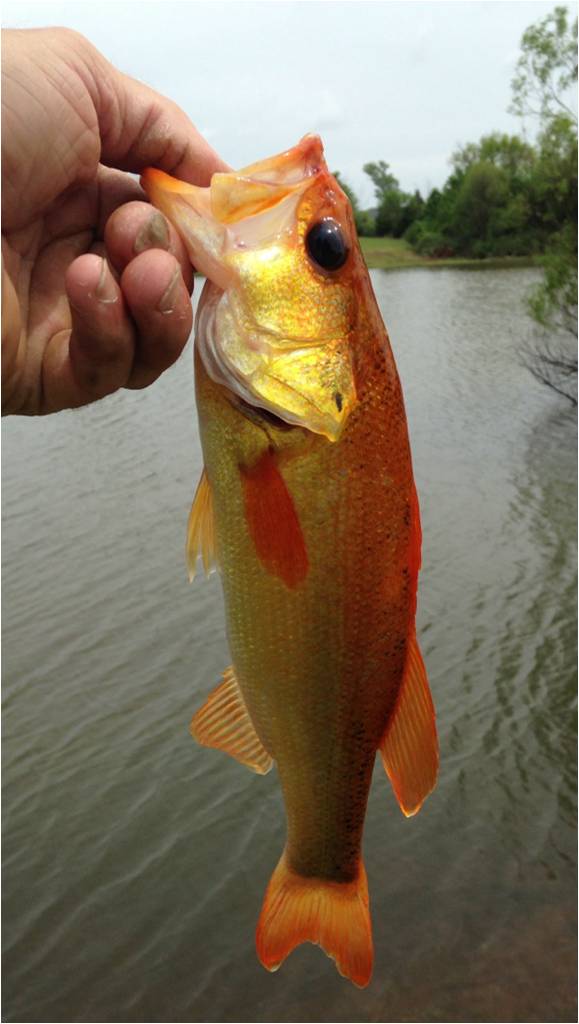
BELLEVILLE, Ontario — Markus Bardy didn’t know what he had just caught when partner Casey Kimmerly netted the yellow gold fish with bright orange fins.
“We both just stood there in awe,” Bardy remembered of that second day of the Quinte Fishing Series tournament on Lake Ontario in September. “We knew that the Bay of Quinte has largemouth bass and smallmouth bass.
“Right away, we wondered if this was another kind of bass.”
Closer inspection revealed that, despite its bizarre coloration, the 3-plus-pound fish did not appear to be a different species.
“Although it had a striking gold color, the tournament directors agreed — correctly, in our opinion — that it was a largemouth based on other features, and it was allowed to be weighed in,” reported the Freshwater Fisheries Conservation Lab of Queen’s University, which had staff on-site for the event that Bardy and Kimmerly went on to win.
Coincidentally, about the same time in Florida, Jeff Puckett landed a bass of similar hue in Titusville’s Fox Lake. That quickly was followed by report of a third at Island Lake in Umatilla, Fla., but the woman who caught it did not take photos.
 Biologist Marty Hale spoke with the angler who called the Florida Fish and Wildlife Conservation Commission (FWC) to see if someone could explain what she had caught.
Biologist Marty Hale spoke with the angler who called the Florida Fish and Wildlife Conservation Commission (FWC) to see if someone could explain what she had caught.
“She did mention that the head appeared to have normal coloration, while the body was bright golden color with black spots,” Hale said.
 And back in June, Nebraska Game and Parks posted a photo of a gold largemouth caught in state waters.
And back in June, Nebraska Game and Parks posted a photo of a gold largemouth caught in state waters.
Reports of so many of these bizarre catches in so short a time is nothing less than a remarkable coincidence.
“To put its rarity into perspective, the FWC has sampled 255,632 largemouth bass from 175 different water bodies over a 10-year period and has no reported sightings of this genetic phenomenon,” the agency said.
Additionally, the director of the Quinte tournament series reported that Dardy’s catch is just the second he has seen in 19 years.
“These fish are rare but not unheard of,” said Gene Gilliland, B.A.S.S. conservation director and a long-time fisheries biologist in Oklahoma. “Some are more gold and some are more orange.
“But in thousands of hours of electrofishing, I never saw one in the wild.”
And you shouldn’t expect to see one either, he added.
“Talk about a target. In nature, a fish that color would have only a small chance of survival. It would have to beat some crazy odds.”
As evidenced by recent catches, some of those bass afflicted with a genetic anomaly known as xanthism do survive. So do a few other fish, birds and reptiles clad in gold.
 What causes this rare condition? In speaking specifically about bass, Dr. Robert Montgomerie, a biology professor at Queen’s University, explained that normal fish scales receive incoming white light, and molecular structures convert that light to blue or yellow, which makes the fish look green.
What causes this rare condition? In speaking specifically about bass, Dr. Robert Montgomerie, a biology professor at Queen’s University, explained that normal fish scales receive incoming white light, and molecular structures convert that light to blue or yellow, which makes the fish look green.
“In the yellow bass, it is likely that some spontaneous mutation occurred that prevented the scales from making the proper molecular structures to convert white light to blue.”
Without those structures, the fish looks gold rather than green.
“It’s not that the bass has gained a yellow pigment, but rather lost the ability to produce the blue colors that make its scales green,” he said.

